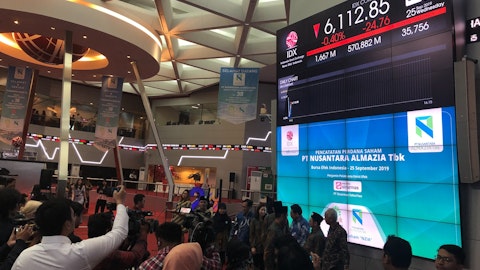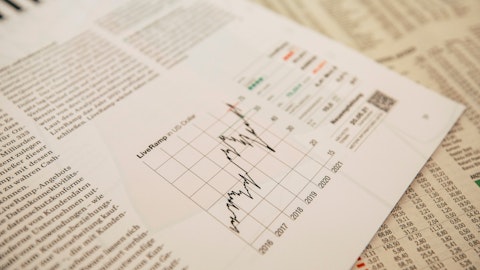Enel Chile S.A. (NYSE:ENIC) Q1 2024 Earnings Call Transcript May 2, 2024
Enel Chile S.A. isn’t one of the 30 most popular stocks among hedge funds at the end of the third quarter (see the details here).
Operator: Good morning, ladies and gentlemen, and welcome to Enel Chile’s First Quarter 2024 Results Conference Call. My name is Victor and I will be your operator for today. During this conference call, we may make statements that constitute forward-looking statements within the meanings of the Private Securities Litigation Reform Act of 1995. Such forward-looking statements reflect only our current expectations, are not guarantees of future performance and involve risks and uncertainties. Actual results may differ materially from those anticipated in the forward-looking statements as a result of various factors. These factors are described in Enel Chile’s press release reporting its first quarter 2024 results. The presentation accompanying this conference call and Enel Chile’s annual report on Form 20-F include under Risk Factors.
You may access our first quarter 2024 results press release and presentation on our website www.enel.cl and our 20-F on the SEC’s website, www.sec.gov. Readers are cautioned to not place undue reliance on those forward-looking statements, which speak only as of their dates. Enel Chile undertakes no obligation to update these forward-looking statements or to disclose any development as a result of these forward-looking statements become inaccurate, except as required by law. I will now like to turn the presentation over to Mrs. Isabela Klemes, Head of Investor Relations of Enel Chile. Please proceed.
Isabela Klemes: [Foreign language] Good morning and welcome to Enel Chile’s 2024 first quarter results presentation. Thank you all for joining us today. My name is Isabela Klemes and I’m the Head of Investor Relations team. Joining me this morning is our CEO and CFO, Giuseppe Turchiarelli. As announced, it on April 29, our shareholders’ meeting has designated a new Board of Directors, and I would like to thank the former members for their contribution to our company over the year and our best wishes for the new members that will be part of our new board. In the sector, governance of our annex, you can find the new names and the ones designated to be the new Chairman of our Board and the Chairman of the Directors committee. Also on the same date, the Board of Directors, [material effect] nominated Giuseppe Turchiarelli as our new CEO.
As to the designation of a new CFO, Giuseppe will also hold in the interim deposition of our CFO. Our presentation and related financial information are available on our website, www.enel.cl in the Investors section and in our Ask Investors. In addition, a replay of the call will soon be available. At the end of the presentation, there will be an opportunity to ask questions via phone or webcast chat through the link, ask a question. [Operator Instructions] In the following slide, Giuseppe will open the presentation with our key highlights of the period, then go through our portfolio management actions and regulatory context updates, and finally, will give us a view of the business economic and financial performance. Thank you all for your attention, and now let me hand over the call to Giuseppe.
Giuseppe Turchiarelli: Thank you, Isabela. Good morning, and thanks for joining us. Let’s start the presentation with our main highlights on Slide 2. In this quarter, our hydro generation portfolio continue to perform remarkably, a result of the exceptional [ideologic] seamless last year, mainly due to El Nino phenomenon in 2023 and a better meltdown season. This performance give us a strong start to the year in terms of efficient generation portfolio mix. Today, the CNE will publish the last month’s regulated section spot price its own [indiscernible] offering. Given this release, we will be able to confirm whether or not our offering was competitive. We will only know the winner name in the coming days. Still on the regulatory side, we have some important news to share.
First, the Chilean Congress approved the law related to the stabilization mechanism PEC 03, a very positive important sign of stability in the energy market. Law 21 667 has already been published last April 30. Second, we continue to expect the new distribution tariff in 2024 to enter into force in the second half of the year. The distribution tariff review 2024-2028 process has already started, and we are expecting some updates in the field next month. We will give inputs on all topics later. In terms of our profitability, I’m pleased to announce that 2024 has started its solid results in terms of EBITDA and net income, which reflects our confidence in our guidance for this year. To conclude, the shareholders meeting approved the final dividend for 2023 of CLP 4.58 per share.
Now in May, we will pay CLP 3.98 per share, complementing the amount already distributed in paid as interim even during January this year. Now let us move to Slide 3 to review how we executed our goals and strategy toward a more efficient generation portfolio mix. The favorable hydrological conditions during 2023 not seen since 2010, allowed us for a more comfortable weather availability until the end of the first quarter 2024. This effect associated with the feat of amazing season during 2024 resulted in higher hydro generation of 0.9 terrawatt hour. Net electricity generation totaled 6.1 terrawatt hour as of March 2024, exceeding by 19% the production during the first quarter of 2013, mainly due to higher hydro renewable generation, resulting from the improved hydrological condition of new projects, respectively.
These also offset the lower thermal dispatch, mostly related to the better hydro situation of the period. Our energy mix totaled 8.5 terrawatt hour in March 2024, 0.8% higher than the level recorded in the first quarter of 2023, primarily due to higher sales to regulated customers. In terms of our balance, during this quarter, we increased our purchases from third parties by around 0.6 terrawatt hour as a part of our continued efforts to diversify our sourcing. As a result, our spot purchases have decreased by 0.9 terrawatt hour. Almost 60% of this reduction was in the non-solar hours. A lot has been told regarding the operations at El Nino for 2024. So we continue to have a conservative hydro projection for 2024 of 9.6 terrawatt hour. [indiscernible] that even if we see a drier scenario for this year versus 2023, the big difference we see from the driest year in the past is that now we have plenty of gas volume to fulfill our needs, thanks to [indiscernible] contract and our long-term energy contract with Shell.
For reference, we have already achieved new firm agreement with several Argentinian gas suppliers for up to 2.6 million cubic meters per day from May to September 2024, and an additional 3.5 million cube meters per day from October to December this year, giving us certainty to optimize our portfolio during 2024. Now let’s move to the next slide to review our main KPI on Slide 4. In terms of renewable investment to increase capacity in this first quarter, we reached 6.5 gigawatt of net capacity, representing a 77% stake in our generation portfolio. This enabled us to reach 76% CO2 free production, 11 basis points higher than in the first quarter of 2023. Regarding Enel X, an important complement to our integrated offerings that support the electrification of our clients, we have improved the performance of several KPIs compared to 2023 [indiscernible] in July.
Regarding the distribution segment, the number of clients in distributive energy in our [indiscernible] continue to grow. For the [indiscernible] KPI, looking at the last 12 months indicator, they have remained in line with the same period of last year. Now on the next slide, let’s look at some aspect relating to the regulatory context. As you may recall, last call, we have indicated that in January this year, the Ministry of Energy presented a law related to the stabilization energy mechanism with the purpose of continuing the PEC and mitigating the projected increases to final customers. At the same time, we also aim to improve the client protection mechanism known as ABC mechanism for low gradual payment of community [indiscernible] generators and establish a transitory subsidy for the most vulnerable clients.
This new law was discussed and approved by the Chilean Congress in April and published and coming to force last Tuesday, April 30. Now we are waiting for two important [effects]. First, the publication of the sovereign guarantee decree needed to start the factoring process. This guarantee shall be presented to investors that will be part of the vision coordinated by the IDB, expected for the next month. Second, the publication of the P&P decree expected by the end of June. With the publication of the document, the tariff on the regulated clients will be active. We expect that the clients shall receive new tariffs at the beginning of the second half of 2024. As of March 2024, we had an account receivable related effect already net of factoring of $849 million.
With the publication of the sovereign decree and the PNP decree, we expect to execute the factoring of the current accounts receivable during the second half of this year ranging from $450 million to $600 million. We expect that by the end of 2024, the accounts receivable net of factoring should range between $400 million and $500 million. On the distribution tariff, the regulatory final report for the 2020-2024 cycle was published in January-February, and then tariff decree, and the same period, the remuneration shall be published within the next few months. Regarding the 2024-2028 cycle initiated in January 2024, we expect that the external consultant responsible for realizing the [indiscernible] company studies have started work. And final report is foreseen to be published early in the Q4 2024.

We expect that by the end of this year, the regulator shall be published the preliminary report of this new cycle. Even though the new cycle shall not have a relevant change in terms of modeling, we will continue our work with leading the association to address the changes in the regulatory model to match the needs we believe the distribution business requires to guarantee that the electrification and decarbonization plan acquired by the government and by the society shall not be just jeopardized by the like of the distribution infrastructure. Now let’s review, on the next slide, how our earnings indicators performed. Our economic and financial performance for this quarter is very solid. Here is a fixed summary of the main figures, which I will detail later.
As you can see, this quarter EBITDA remains stable compared to the first quarter of 2023 even though in the first quarter 2023 we had an important contribution from gas trading activity. Our generation portfolio mix in the quarter explain largely these solid results. The net income improved by 6% compared to the same period last year, reaching $157 million for this quarter. This was mainly due to the recognition of PEC 2 interest, which positively impacted the financial results. Net FFO also showed an improvement of 34% in the period, which reached $114 million in this quarter. The improvement too has been impacted by the [indiscernible] we will see more details in the following slides. Now on the next slide, let’s review the progress on CapEx. Our total CapEx reached $179 million in the first quarter, which is 65% higher than the figures from the first quarter of the last year.
I would like to mention that 67% of our total CapEx is totaling $120 million and was related to renewables and storage, and 22% to $40 million was related to grid, mainly due new customer commissions as a result of the growth of our customer base. Regarding asset management CapEx, which represents 30% or $54 million of our total CapEx, it increased by around 50% compared to the last year’s figures, mainly explained by increased maintenance activity in conventional generation trends and distribution business. Finally, development CapEx reached $103 million, representing 58% of our total CapEx, an increase of 77% compared to the last year figures. Considering our renewable portfolio and cost structure and activity at some of our hydrology plants to improve their efficiency.
Let’s now take a look at the next slide where we will review a summary of this first quarter EBITDA. In the first quarter of 2024, our EBITDA reached $293 million, in line with the last three-year figures. Let me explain the main effects of this cost. First, I’d like to highlight the positive contribution from PPA sales increasing to $53 million, primarily due to higher volume mainly in regulated markets and indexation in the free market. Second, a positive effect of $40 million of the industrial sourcing, mainly explained by lower variable costs, considering a better regulatory scenario and a more efficient generation mix that enable to reduce our fuel consumption. Third, the positive contribution of $47 million related to commercial sourcing, primarily due to lower purchases in the stock market in terms of lower volumes and lower prices, partially offset by higher volume passes from third party.
In addition, we had a positive effect of $4 million related to the grid margin. This variation is mainly explained by the greater remuneration, which is associated with the VAD 2020-2024 regulatory report publication. The above mentioned effects were partially led by first, a negative effect of $118 million related to the gas trading activities carried out during the first quarter 2023 for around 10 [indiscernible]; second, we had a negative effect of $25 million related to the Metka PPA agreement signed in 2023. Let’s move on to the next slide where we will review the net income evolution accounting for $157 million. Our net income increased by 6% versus last year figures, let me [indiscernible] El Nino effect. EBITDA in line with the last figure as already explained, higher depreciation, amortization of $13 million, mainly resulting from higher depreciation in power due to our new renewable projects in operation and in Chilean peso devaluation in the period, which was partially offset by the change in the consolidation perimeter given [indiscernible], partially offset by lower bad debt accrued [indiscernible] due to a reduction in the commission debt level as a result of the commercial agreement and capping programs executed in the period.
Regarding financial results and investment, we recorded a $19 million improvement primarily explained by $21 million related to higher interest and adjustment due to the PEC 2 recognition. Income taxes decreased by $2 million, mainly due to penalties provisions reversion from preliminary period. Moving to FFO analysis on the next slide. When reviewing our FFO for this period, this quarter, our FFO reached $114 million, representing an improvement of $29 million compared to the same period in 2023. [indiscernible] explain our FFO in this year. $293 million coming from EBITDA, mainly thanks to our PPA sales and a positive performance of the industrial and commercial sourcing as explained previously. And negative effect coming from the cumulative stabilization mechanism effect in our receivable — to $105 million this quarter.
This negative effect is being partially offset by the execution of the IDB capital related to PEC 2, which amounted to $15 million this quarter. The result and negative effect coming from the working capital that reached $29 million as a continuance of payment coming from 2023. In addition, income tax this quarter negatively impacted our FFO by $26 million, mainly explained by tax savings in generation business in 2024. To conclude, in terms of financial expenses, we paid $34 million debt interest. Making the comparison of the FFO between first quarter 2024 and first quarter 2023, we can see how the figures are very much in line. The only main difference is related the net impact of the PEC accumulation, as you can see in this slide. Now let’s take a look at our liquidity and leverage position.
Our gross debt decreased around 1% to $4.4 billion by the end of March 2024 versus December 2023. We foresee that our net debt will continue to decrease by second half 2024, considering the execution of net working capital section expected for the period. Therefore, the [indiscernible] investment level is a temporary condition that will be recovered by the end of the year. The average of our debt maturity decreased temporarily to 5.7 years as of March 2024 from 6.1 years as of December 2023. And the portion at the fixed rate is maintained at 58% of the total debt in line with December 2023. The average cost of our debt reached 4.83% as of March 2024 in line with December 2023. In terms of liquidity, we had a comfortable position to support upcoming investment we see in 2024 we’ve and cope with possible headwind in the debt market related to the economic situation.
As of March 31, 2024, we had signed two new credit lines with third parties, totaling $150 million and with a fee $750 million. In terms of maturity for 2024, we have approximately $770 million during 2024, including $400 million of the Yankee bond in [indiscernible] which was successfully paid in April. The payment was realized using a short-term intercompany investment between Enel Finance and Enel Chile using part of the revolving committed credit lines available for NLG. Now I will close the presentation with some closing remarks. We had a strong start to the year in terms of operating performance, mainly in generation business. The better-than-expected hydrology in 2023 was reflected in a better reservoir level at the beginning of this year.
The pace of demand seen in our generation needs also supported our solid results. Sound liquidity put us in a comfortable position to support our short-term strategy and cover the maturity over the plain period part of our derisking and deleveraging strategy announced in our last Capital Market Day. Finally, the next month, it’ll be very important in terms of regulatory update for the sector as the release of the sovereign currency decree that will support the start of the factory and the debt recovery as well as the publication of the 2020-2024 tariff decree of the distribution business. Let me now hand over to Isabela.
Isabela Klemes: Thank you for your attention. Now let’s begin with the Q&A section. We will receive questions via phone and chat in the webcast. The Q&A section is open. Operator, please, you may start.
Operator: [Operator Instructions] Our first question comes from the line of Javier Suarez from Mediobanca.
See also 30 Most Fun Cities in the US in 2024 and 15 Best Places to Retire in Florida That You’ve Never Heard Of.
Q&A Session
Follow Enel Chile S.a. (NYSE:ENIC)
Follow Enel Chile S.a. (NYSE:ENIC)
Receive real-time insider trading and news alerts
Javier Suarez: Congratulations to Giuseppe for the appointment of new CEO. Two or three questions. The first one is on the impact that the approval of the new stabilization mechanism may have on the working capital improvement during 2024 and the next following year, particularly in the period 2024 to 2026, this approved by the Congress, and that should have a positive impact on the cash flow generation. Second point is also on your latest expectations from the approval of the 2020 to 2024 electricity distribution tariff. The tariffs decrease should be valued in the third quarter. But if you can share with us your latest expectations on what you see or quantify as possible upside from this new regulation? And the third comment is if you can share with us your latest expectation by debt — for the debt of the Company by the year-end?
And the final comment is on the comment that you have made that you feel comfortable with current guidance for 2024. So my argument would be that taking into consideration that hydro production is higher or is likely to be higher than your assumption in the current business plan, taking into consideration that the new stabilization mechanism should allow for the collection of some pending regulatory receivables, there should be some upside from the new distribution framework. Shouldn’t we see current target as conservative? If you can elaborate on that, that would be helpful.
Isabela Klemes: Giuseppe?
Giuseppe Turchiarelli: Thank you for your congratulations. Well, in terms of price stabilization mechanism, as I said previously, the law has been approved and public. So now we are waiting for several next steps, which are probably the most important fact that we are waiting for are, first of all, the mission of the sovereign decree that give us the guarantee that we cover 30% of our credit we need in order to proceed with the factoring. And the second set is the indication that in decree at the end of June, basically we can define exactly an amount of factoring that is supposed to be done in the second half. Now second half means between the end of third quarter, beginning of fourth quarter. And we are talking about our estimation according to the information that we have, should be between $450 million and $600 million.
If we are able to proceed with this factoring, we are going to close the year with accounts receivable that will be between $400 million and $500 million. Consider that — let me say, most of this amount will be recovered between 2025 and 2026 with a small portion related to the PEC 1 that will be recovered in 2027 according to the law. So this was what concerned the first question. In terms of the impact of VAD 2020 and 2024, we have already included in our profit and loss. So we are talking about around $20 million comparing with our previous assumption. In terms of that at the end of the year, we’re supposed to close the year with a net debt of around $3.6 million. Let me say that clearly, this amount that I’m giving you is based also on the possibility of performing the factoring that we already mentioned.
So if everything is going well, we are going to close $3.6 million net debt at the end of the year with ratio net-debt-to-EBITDA lower than 3x as our guidance and target already in the cluster time. The guidance, yes, is apparently with the results of the first quarter clearly expected a better guidance. As I said at the beginning, we are not — we don’t know yet how the raining season will perform. So basically, we prefer to be conservative to confirm the guidance that we declared in the capital market. Clearly, there could be some possible upside, but it’s [indiscernible]. We probably give you a better or a more updated guidance as soon as we’re going to close the second half because as you probably remember, the new season use to start end of April, beginning of May, or the closing of — for the closing on June, that will be public at the end of July, we are able to give a better view on the guidance.
But as of today, we confirm the guidance that we presented in the Capital Markets Day.
Javier Suarez: And to be just 100% crystal clear on your first answer on the amount of regulatory receivables by the year-end. So you were mentioning that that amount of regulatory receivables by the year-end should be along the lines of $400 million, and that should mean a reduction through the year between $400 million to $600 million. Is this correct?
Giuseppe Turchiarelli: Yes. Between $400 million and $500 million will be the year-end credit receivables, depending on how much we’re able to do in terms of [indiscernible]. Again, I will repeat it, the factoring we’re supposed to have between $450 million to $600 million in terms of factoring, and we are estimating to close the year with a credit between $400 million and $500 million.
Isabela Klemes: As we do not save another question from the line, let’s go to the chat. Okay. The first question to me from Fernando Gonzalez from BTG. Fernando is saying, Giuseppe, congratulations on your appointment, can we assume continuity from a strategic point of view, or is there something different that you’d like to focus on? What are the things that you will dedicate more time and that concerns you most in the Company? Then Fernando has other questions. So go one by one. That’d be better.
Giuseppe Turchiarelli: Thank you, Fernando, for your congratulation. And well in general, I can tell you that no change in terms of strategy. I mean, we stick with the strategy that we have already presented last year in our Capital Markets Day. So the topics and the focus of the Company is the same. That means the capitalization in terms of clearly increase our capacity in terms of renewable with special focus on the financial stability that we have as a pillar in our strategy. So I don’t see any kind of changes so far.
Isabela Klemes: Okay. So let’s go to the second question. Could you please elaborate more on the $25 million negative impact on EBITDA from the Metka PPA agreement?





